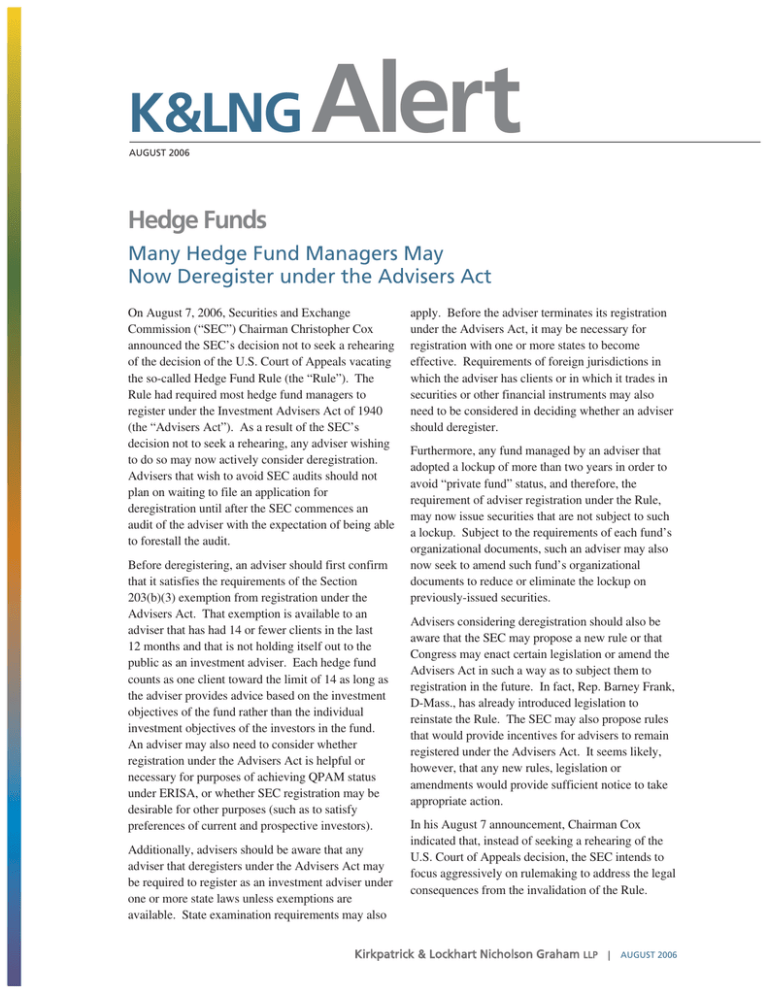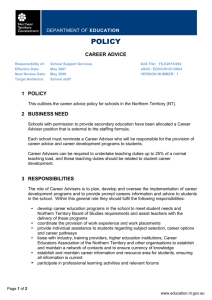
K&LNG
AUGUST 2006
Alert
Hedge Funds
Many Hedge Fund Managers May
Now Deregister under the Advisers Act
On August 7, 2006, Securities and Exchange
Commission (“SEC”) Chairman Christopher Cox
announced the SEC’s decision not to seek a rehearing
of the decision of the U.S. Court of Appeals vacating
the so-called Hedge Fund Rule (the “Rule”). The
Rule had required most hedge fund managers to
register under the Investment Advisers Act of 1940
(the “Advisers Act”). As a result of the SEC’s
decision not to seek a rehearing, any adviser wishing
to do so may now actively consider deregistration.
Advisers that wish to avoid SEC audits should not
plan on waiting to file an application for
deregistration until after the SEC commences an
audit of the adviser with the expectation of being able
to forestall the audit.
Before deregistering, an adviser should first confirm
that it satisfies the requirements of the Section
203(b)(3) exemption from registration under the
Advisers Act. That exemption is available to an
adviser that has had 14 or fewer clients in the last
12 months and that is not holding itself out to the
public as an investment adviser. Each hedge fund
counts as one client toward the limit of 14 as long as
the adviser provides advice based on the investment
objectives of the fund rather than the individual
investment objectives of the investors in the fund.
An adviser may also need to consider whether
registration under the Advisers Act is helpful or
necessary for purposes of achieving QPAM status
under ERISA, or whether SEC registration may be
desirable for other purposes (such as to satisfy
preferences of current and prospective investors).
Additionally, advisers should be aware that any
adviser that deregisters under the Advisers Act may
be required to register as an investment adviser under
one or more state laws unless exemptions are
available. State examination requirements may also
apply. Before the adviser terminates its registration
under the Advisers Act, it may be necessary for
registration with one or more states to become
effective. Requirements of foreign jurisdictions in
which the adviser has clients or in which it trades in
securities or other financial instruments may also
need to be considered in deciding whether an adviser
should deregister.
Furthermore, any fund managed by an adviser that
adopted a lockup of more than two years in order to
avoid “private fund” status, and therefore, the
requirement of adviser registration under the Rule,
may now issue securities that are not subject to such
a lockup. Subject to the requirements of each fund’s
organizational documents, such an adviser may also
now seek to amend such fund’s organizational
documents to reduce or eliminate the lockup on
previously-issued securities.
Advisers considering deregistration should also be
aware that the SEC may propose a new rule or that
Congress may enact certain legislation or amend the
Advisers Act in such a way as to subject them to
registration in the future. In fact, Rep. Barney Frank,
D-Mass., has already introduced legislation to
reinstate the Rule. The SEC may also propose rules
that would provide incentives for advisers to remain
registered under the Advisers Act. It seems likely,
however, that any new rules, legislation or
amendments would provide sufficient notice to take
appropriate action.
In his August 7 announcement, Chairman Cox
indicated that, instead of seeking a rehearing of the
U.S. Court of Appeals decision, the SEC intends to
focus aggressively on rulemaking to address the legal
consequences from the invalidation of the Rule.
Kirkpatrick & Lockhart Nicholson Graham LLP |
AUGUST 2006
Among the new SEC rulemaking proposals
announced by Chairman Cox is an anti-fraud rule
under the Advisers Act that would have the effect of
“looking through” a hedge fund to its investors. This
proposed rule would establish that the anti-fraud
provisions of the Advisers Act apply directly to the
adviser’s dealings with investors in the hedge fund,
not just with the fund itself.
According to Chairman Cox, the SEC is also
considering whether it should increase the minimum
asset and income requirements for investors in hedge
funds. Other SEC initiatives announced by
Chairman Cox include the grandfathering, transition
and other miscellaneous relief necessitated by the
vacating of the Rule, which are designed to eliminate
disincentives for voluntary registration and to enable
hedge fund advisers that are already registered to
remain registered. Finally, Chairman Cox
emphasized that the SEC would continue to
vigorously enforce the federal securities laws against
hedge funds and hedge fund advisers who violate
those laws.
Nicholas S. Hodge
617.261.3210
nhodge@klng.com
Kay Gordon
212.536.4038
kgordon@klng.com
Girish S. Kashyap
617.951.9124
gkashyap@klng.com
If you have questions or would like more information about K&LNG’s Hedge Fund Practice, please contact one of our
lawyers listed below, or send general inquiries via e-mail to hedgefunds@klng.com.
BOSTON
Mark P. Goshko
Nicholas S. Hodge
LONDON
Philip J. Morgan
617.261.3163 mgoshko@klng.com
617.261.3210 nhodge@klng.com
+44.20.7360.8123 pmorgan@klng.com
LOS ANGELES
William P. Wade
310.552.5071 wwade@klng.com
NEW YORK
Beth R. Kramer
Richard D. Marshall
212.536.4024 bkramer@klng.com
212.536.3941 rmarshall@klng.com
SAN FRANCISCO
David Mishel
Mark D. Perlow
415.249.1015 dmishel@klng.com
415.249.1070 mperlow@klng.com
WASHINGTON
Cary J. Meer
202.778.9107 cmeer@klng.com
Robert H. Rosenblum 202.778.9464 rrosenblum@klng.com
www.klng.com
BOSTON • DALLAS • HARRISBURG • LONDON • LOS ANGELES • MIAMI • NEWARK • NEW YORK • PALO ALTO • PITTSBURGH • SAN FRANCISCO • WASHINGTON
Kirkpatrick & Lockhart Nicholson Graham (K&LNG) has approximately 1,000 lawyers and represents entrepreneurs, growth and middle market companies,
capital markets participants, and leading FORTUNE 100 and FTSE 100 global corporations nationally and internationally.
K&LNG is a combination of two limited liability partnerships, each named Kirkpatrick & Lockhart Nicholson Graham LLP, one qualified in Delaware, U.S.A.
and practicing from offices in Boston, Dallas, Harrisburg, Los Angeles, Miami, Newark, New York, Palo Alto, Pittsburgh, San Francisco and Washington and
one incorporated in England practicing from the London office.
This publication/newsletter is for informational purposes and does not contain or convey legal advice. The information herein should not be used or relied
upon in regard to any particular facts or circumstances without first consulting a lawyer.
Data Protection Act 1988—We may contact you from time to time with information on Kirkpatrick & Lockhart Nicholson Graham LLP seminars and with our
regular newsletters, which may be of interest to you. We will not provide your details to any third parties. Please e-mail london@klng.com if you would
prefer not to receive this information.
© 2006 KIRKPATRICK & LOCKHART NICHOLSON GRAHAM LLP. ALL RIGHTS RESERVED.












